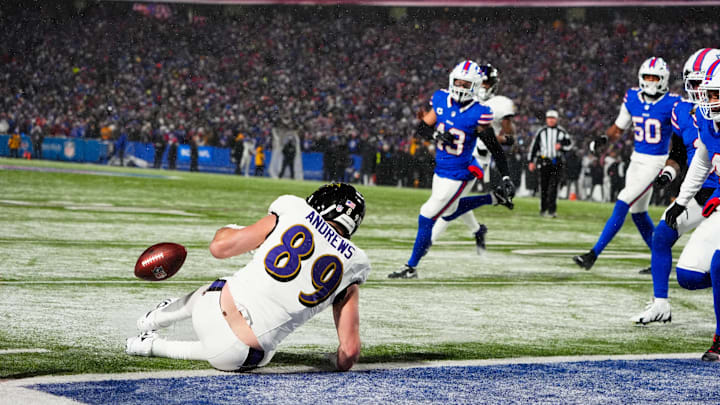Harbaugh's decision on a two point missed conversion early in the game effectively ended the Ravens' season

In this story:
The Baltimore Ravens went 0 for 2 in two-point conversions on Sunday night's 27-25 loss to the Buffalo Bills.
It's a mistake that will leave head coach John Harbaugh and Ravens fans with many sleepless nights this offseason.
Many will focus on the missed two point conversion near the end of the game where TE Mark Andrews dropped a Lamar Jackson pass.
But an equally important play happened in the third quarter, after Derrick Henry cut the Bills lead to 21-19 on a five-yard touchdown run with 1:41 left in the third quarter.
Harbaugh followed "the coaches book" and went for two points. But the Jackson pass attempt was batted down by Bills LB Matt Milano and the Ravens remained down by two. This decision to go for two rather than kick an extra point would come back to haunt the Ravens.
Two-Point Pass conversion failed ❌
— Roman Mungarro (@romanmungarro) January 20, 2025
Ravens 19-21 Bills
pic.twitter.com/cIGPW9j9qu
The Ravens' two targets on their two 2-pt attempts. Just brutal stuff. pic.twitter.com/FcXC55orPr
— Benjamin Solak (@BenjaminSolak) January 20, 2025
With 1:44 left in the game and the Ravens down by 8, Isaiah Likely scored on a 24 yard scoring strike from Jackson that narrowed the Bills lead to 27-25.
The earlier missed two point conversion was now crucial as the Ravens remained down by two instead of only needing an extra point to tie the game with over a minte left.
Mark Andrews dropped the two-point conversion pass for the tie, effectively ending the game. The Bills won 27-25.
Mark Andrews dropped the two-point conversion.
— Ravens Nation 𝙇𝙄𝙑𝙀 (@LIVERavenNation) January 20, 2025
Just sickening. pic.twitter.com/4U1x8OqkQl
— Enjoy free coverage of the Bills from Buffalo Bills on SI —
More Buffalo Bills News:

Chris is an experienced digital content producer with prior roles in journalism and corporate communications. He has worked as a sports and news writer and editor at McClatchy, Tribune and Gannett. Chris is based in Columbus, Ohio.
Follow chrispughedits